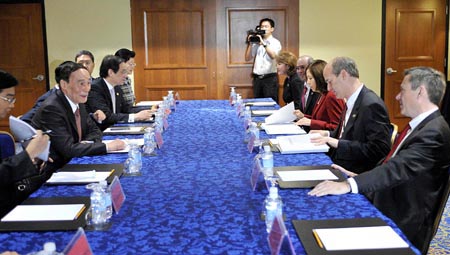China and the USdisplayed greater maturity but made no significant breakthroughs except in new energy cooperation in the first round of their Strategic and Economic Dialogue, according to Chinese experts.
 |
|
Chinese Vice Premier Wang Qishan (L2) meets with US Congressmen in Washington, D.C., on July 26, 2009, the day before the first round of the China-US Economic and Strategic Dialogue, which is to be held in Washington, D.C. from July 27 to 28. [Zhang Yan/Xinhua]
|
At a joint press conference attended by four representatives of both countries, US Secretary of State Hillary Clinton said the two-day dialogue that ended Tuesday in Washington was "unprecedented" in enhancing bilateral relations, gathering the most high-level leaders, discussing an "unparalleled" range of issues and establishing "a new pattern of cooperation" between the two countries.
The two sides confirmed that President Barack Obama will visit China this year at the invitation of President Hu Jintao.
On the economic track, led by US Finance Secretary Timothy Geithner and Chinese Vice Premier Wang Qishan, the world's biggest developed and developing economies pledged to take measures to promote "balanced and sustainable" economic growth in their domestic economies to ensure a "strong recovery" from the international financial crisis.
On the strategic track, led by Clinton and China's State Councilor Dai Bingguo, the two countries agreed to work closely as the world's top two carbon emitters to seal a new global treaty on climate change at December's UN conference in Copenhagen.
The nations signed a "memorandum of understanding" that aims to promote discussion on domestic strategies and policies for addressing climate change, practical solutions for pursuing the transition to low-carbon economies and successful international negotiations on climate change.